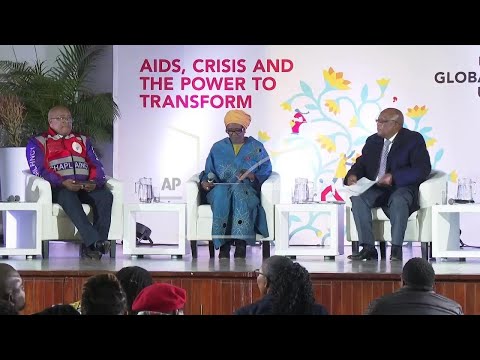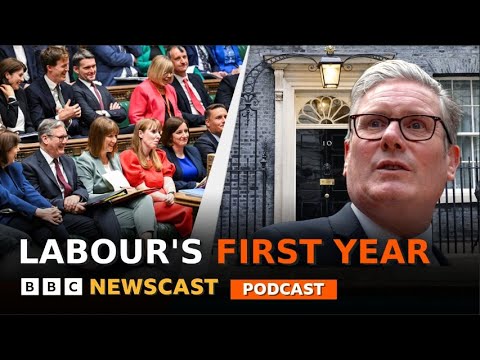(10 Jul 2025)
RESTRICTION SUMMARY:
ASSOCIATED PRESS
Germiston, South Africa – 10 July 2025
1. Wide of Reverend and HIV Patient Mbulelo Dyasi, Executive Director of UNAIDS Winnie Byanyima and South African Health Minister Aaron Motsoaledi (left to right) at a panel discussing the UNAIDS report
2. SOUNDBITE (English) Winnie Byanyima, Executive Director of UNAIDS:
"That the sudden withdrawal of the single biggest HIV donor combined with other cuts of aid from other governments that were happening more gradually is putting this progress at risk, particularly for the low income, highly burdened countries, again mostly on this continent."
3. Mid of audience listening
4. SOUNDBITE (English) Winnie Byanyima, Executive Director of UNAIDS:
"We also see that the impact of this disruption, that the disruption itself is not just financial. We also see that there is a backlash against rights, laws, policies that create that enabling environment for people to come forward and get life saving services."
5. Wide of panel
6. SOUNDBITE (English) Aaron Motsoaledi, South African Health Minister:
"There is hope. There is hope of Lenacapavir. There is hope. That is going to change the game. It’s a game changer and I can promise that we will move mountains and rivers to make sure that every adolescent girl who needs Lenacapavir is going to get it."
7. Mid of audience listening
8. Mid of attendees gathering outside the venue
9. SOUNDBITE (English) Bonisiwe Hlongwane, HIV/AIDS Manager at Bertha Gxowa Hospital:
"It’s, it’s really impacting us negatively because now we need to bring those people that interrupted treatment a long time ago based on different reasons. We need to bring them back to care, but now the question is how do we reach them because some of them, they give us wrong addresses. We can’t go to them. We need to teletrace them, but also the resources, they are very limited. But we are trying our level best. As the minister has said, we are no longer going backwards. We’re coming a very long way. We can’t give up now."
10. Mid of Dyasi taking notes outside Bertha Gxowa Therapeutic Services
11. SOUNDBITE (English) Mbulelo Dyasi, Reverend and HIV Patient:
"Americans came here with volunteers, operating as a collective. We’ll continue with that spirit. Hence I said inside – this time around we’re not dying. We are refusing. We’re not dying this time. I mean, I’m on ARVs (antiretrovirals) as well and my ARVs are not affected."
12. Wide of the panel
STORYLINE:
Years of American-led investment into AIDS programs has reduced the number of people killed by the disease to the lowest levels seen in more than three decades.
But in the last six months, the sudden withdrawal of US money has caused a “systemic shock,” U.N. officials warned.
They also warned if the funding isn’t replaced, it could lead to more than 4 million AIDS-related deaths and 6 million more HIV infections by 2029.
“The sudden withdrawal of the single biggest HIV donor combined with other cuts of aid from other governments that were happening more gradually is putting this progress at risk, particularly for the low income, highly burdened countries, again mostly on this continent,” said Winnie Byanyima, the executive director of the UN agency that fights HIV, UNAIDS.
UNAIDS also said it feared other major donors might also scale back their support, reversing decades of progress against AIDS worldwide — and that the strong multilateral cooperation is in jeopardy due to wars, geopolitical shifts and climate change.
Even before the U.S. funding cuts, progress against curbing HIV was uneven.
Find out more about AP Archive: http://www.aparchive.com/HowWeWork
Twitter: https://twitter.com/AP_Archive
Facebook: https://www.facebook.com/APArchives
Instagram: https://www.instagram.com/APNews/
You can license this story through AP Archive: http://www.aparchive.com/metadata/youtube/3d2a0d868dee4e31861b6d3a69faf27c
Author: AP Archive
Go to Source
News post in July 15, 2025, 9:05 pm.
Visit Our Sponsor’s:
News Post In – News





